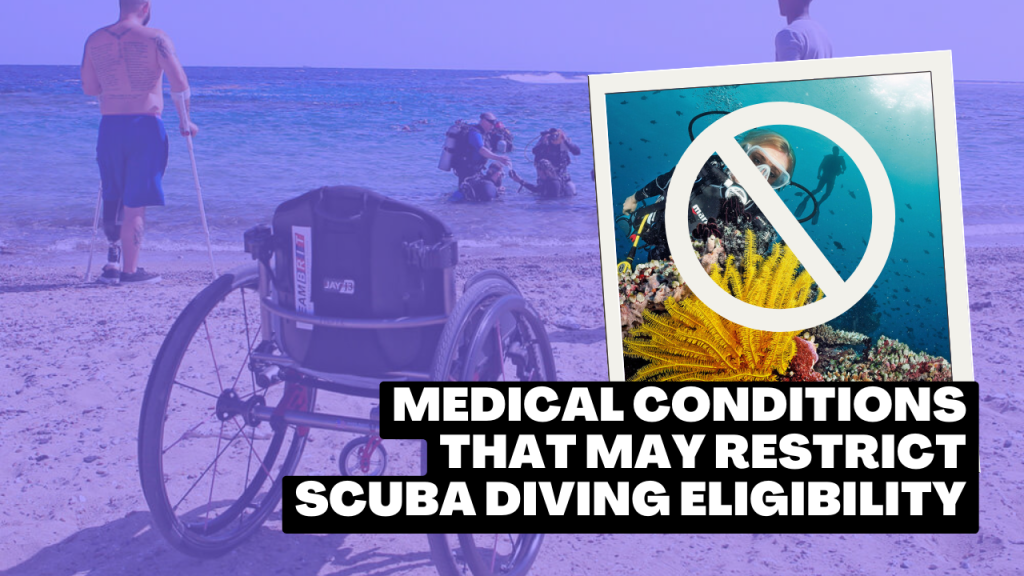
Scuba diving is a physically demanding activity that requires good health and fitness. Before engaging in scuba diving, it’s important to have a medical check-up to determine if you have any medical conditions that could put you at risk. Here are some medical conditions that may prevent you from scuba diving in andaman:
- Lung or respiratory problems such as asthma, emphysema, or chronic bronchitis: Scuba diving involves breathing compressed air, which can exacerbate existing lung or respiratory problems. Conditions such as asthma, emphysema, or chronic bronchitis can increase the risk of lung damage or lung collapse while diving.
- Heart or circulatory disorders such as heart disease, high blood pressure, or history of stroke or heart attack: Scuba diving puts a strain on the cardiovascular system, and individuals with heart disease, high blood pressure, or a history of stroke or heart attack may be at risk of complications such as heart failure, pulmonary edema, or stroke.
- Neurological disorders such as epilepsy, seizures, or stroke: Neurological disorders such as epilepsy, seizures, or stroke can cause loss of consciousness or impaired motor function, which can be dangerous while diving.
- Ear problems such as ear infections, perforated eardrums, or a history of ear surgery: Scuba diving involves changes in pressure, which can cause ear pain, vertigo, or ruptured eardrums. Individuals with a history of ear surgery, ear infections, or perforated eardrums may be at risk of complications while diving.
- Sinus problems or nasal congestion: Sinus problems or nasal congestion can make it difficult to equalize the pressure in the sinuses and ears while diving, which can lead to discomfort, pain, or injury.
- Diabetes or other metabolic disorders. Individuals with diabetes or other metabolic disorders may be at risk of complications such as hypoglycemia or hyperglycemia while diving, which can lead to loss of consciousness or impaired judgment.
- Blood disorders such as anemia or sickle cell disease: Blood disorders such as anemia or sickle cell disease can affect the body’s ability to carry oxygen, which can be dangerous while diving.
- Pregnancy: Scuba diving during pregnancy can pose a risk to the fetus, and is generally not recommended.
- Psychological conditions such as panic attacks, claustrophobia, or anxiety disorders: Psychological conditions such as panic attacks, claustrophobia, or anxiety disorders can be triggered or exacerbated while diving, which can be dangerous in an underwater environment.
- Medications: Certain medications, such as blood-thinning medications or some drugs used to treat psychiatric conditions, can increase the risk of complications while diving.
It’s important to note that scuba diving can be a safe and enjoyable activity for individuals with some of these medical conditions, as long as they are properly managed and monitored. However, it’s important to consult with a qualified diving physician to determine your individual risk and eligibility for scuba diving.
Scuba diving for people with a disability
Scuba diving can be an incredibly rewarding and inclusive activity for individuals with disabilities. With the right training, equipment, and support, individuals with a wide range of disabilities can experience the freedom and adventure of diving. Here are some examples of how scuba diving can be adapted for individuals with different types of disabilities:
- Physical disabilities: Individuals with physical disabilities, such as spinal cord injuries or amputations, can use adapted diving equipment such as weight systems, fins, and propulsion devices to help them move underwater. Some dive operators also offer specialized lifts or ramps to help individuals with mobility impairments access the water.
- Visual impairments: Individuals with visual impairments can dive with the assistance of a guide, who uses hand signals and verbal cues to communicate underwater. Some dive operators also offer tactile cueing systems or other adaptive equipment to help individuals with visual impairments navigate the underwater environment.
- Hearing impairments: Individuals with hearing impairments can communicate underwater using hand signals or written notes. Some dive operators also offer visual cueing systems or other adaptive equipment to help individuals with hearing impairments navigate the underwater environment.
- Cognitive or developmental disabilities: Individuals with cognitive or developmental disabilities can dive with the assistance of a trained instructor or support staff, who can help them learn the necessary skills and ensure their safety underwater.
- Medical conditions: Individuals with medical conditions such as asthma, diabetes, or heart disease can dive with the guidance of a qualified diving physician, who can assess their individual risk and provide appropriate medical clearance and support.
In addition to these adaptations, scuba diving can also provide a sense of empowerment, independence, and social connection for individuals with disabilities. There are many organizations and dive operators around the world that specialize in adaptive scuba diving and offer specialized training, equipment, and support for individuals with disabilities.
Conclusions
Scuba diving is a physically demanding activity that requires good health and fitness. Individuals with certain medical conditions may be at risk of complications while diving, and it’s important to consult with a qualified diving physician to determine your eligibility for scuba diving. However, with the right training, equipment, and support, scuba diving can be an inclusive and empowering activity for individuals with disabilities. Adaptive scuba diving can provide individuals with disabilities with a sense of freedom, adventure, and social connection, and there are many organizations and dive operators around the world that specialize in adaptive scuba diving. Whether you’re an experienced diver or someone who is looking to try something new, scuba diving can be a rewarding and exciting experience that is accessible to everyone.